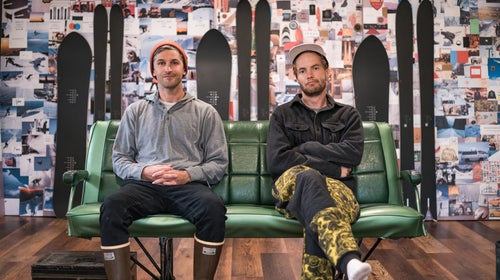The first thing skier says on our call is that he knows that what his startup��business is��doing is slightly hypocritical. He’s Zooming from in front of the mood board at the Oregon headquarters of , the ski and snowboard company��he’s launching with snowboarder . The two pro��athletes—along with a team of industry vets from Armada, K2, and Line—are selling new skis and boards��in part��to get people to buy fewer of them.
It’s��gift-guide and new-ski season, but it’s also the time of year when we��can most feel the itch of consumerism. We’re��stuck at home clicking on��pictures of the latest shiny versions of��items��we��already have.��The tension of trying to be a good consumer—trying to keep our personal footprints small—rubs up against the appeal of different, better things. And in the gear world, where equipment can make a real difference in performance, the pull of new products is strong.
Like so much of��the outdoor industry, sales of snow hard goods are predicated on a seasonal cycle of emerging��products. Every fall, brands roll out new models and tout their innovations in an attempt��to sell as much gear as possible before the holiday rush. And that sales cycle is a significant economic spike. A November report from the U.S. Bureau of Economic Affairs found that outdoor recreation added $459.8 billion to the American economy last year—and retail was nearly a quarter of that.
Smith and Pollard have been sponsored athletes since they were teenagers. Pollard, who is also an artist, spent 21 years riding for Line skis and put out nearly 50 coveted pro models that feature both his ski design and his artwork. Smith’s Nitro boards have a similar cult following. But both started to feel uncomfortable constantly creating new products when those products��weren’t all that different from the previous��year’s gear. They knew it made sense��business-wise, but it felt morally questionable and uncreative.
“Selling new jackets to our buddies year after year started to eat at our souls,” Pollard says. “The old equation worked, it had a lot of blue sky, but we don’t want to be the old band playing the hits.”
The two started talking��about what they, as athletes who had been heavily involved in product design and who had some cultural sway, could do to change snow sports’ product footprint, to slow it down and make skis and boards��with longer lives. They looked at other industries, like construction, for inspiration. “It’s not like you go out and buy a new hammer every year,” Smith says.
He and Pollard decided they were going to make three board models and three ski models, all built to last. The products��have black topsheets (which��will stay the same every year), versatile shapes, and come with a built-in maintenance plan through Evo, which will provide free tuning��and waxing. “It feels right in terms of taking some responsibility,” Smith says. “If we were going to speak to longevity, we had to put our money where our mouth was.”
Season’s plan is to change the footprint and life span of its��products��and to share that responsibility between the brand (which will break��the new-gear-every-year product cycle), the shop (which will maintain��the product for life), and the user��(who will��theoretically��hold on to their gear for a long time). Pollard knows it’s not a perfect plan, and he doesn’t actually know if it’s going to work—“Maybe everyone buys our stuff once, and then we’re done,” he says—but he thinks it’s��important to try.
The company is part of a wide, slow wave of conscious consumerism taking hold in��the outdoor industry. The edge of the wave is probably Patagonia, which attracted��good and bad attention with its��2011 “” ad,��but it also includes NeedEssentials’ unbranded surfing��basics and��REI selling used gear on its website. Season is eyeballing the��same environmental challenge that’s confronting so many sectors, from to��: Can we do it—whatever it is—better without sacrificing what consumers expect?
Reducing excess across the outdoor-retail world has to include movement from many different directions. It has to come from change in the supply chain, change in consumer culture, and change in how gear is transported, marketed, and monetized, all while still working within a product-driven economy.
So maybe Season’s plan is slightly hypocritical, maybe it’s not perfect, and maybe it won’t even work, but it’s a step forward on an imperfect path that a lot of businesses��are trying to walk. And if we wait around for morally pure, totally perfect solutions to the outdoor world’s waste and overuse, it’s going to be a long, long wait.


